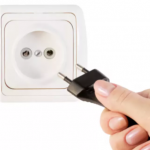If you notice that in some places the layer of tile began to move away from the surface - you can’t hesitate, otherwise you will soon have to replace it entirely. First you need to establish the reason why the tile falls off. And there may be several reasons:
- Building drawdown - this effect is characteristic of new buildings. Alas, nothing can be done here and it remains only to patch up problem areas;
- Sharp temperature changes often affect the strength of the adhesive and tiles. Try to prevent such global changes;
- Mechanical damage, including vibration. The tile may well “sprinkle” due to a nearby construction site or after an accidental hit on it;
- Properly mixed mortar is the key to a strong foundation for tiling. Too economical or, conversely, a thick layer of the composition leads to delamination;
- Tile masonry was originally carried out on an uneven surface;
- Each type of tile requires compliance with the optimal level of heat and humidity;
- The voids in the adhesive base are more than 10% of the surface area of the entire masonry.

Only after the elimination of one or several reasons, if they are associated with external factors, it is possible to repair the tiles.

How to glue fallen tiles
If only part of the tile has fallen off, you can try to restore it, provided that the element has no cracks. It will not be superfluous to check for voids by tapping.

Observe proportions when mixing the adhesive base yourself. If you do not have such experience, use ready-made mixes and mastics. Quickly glue the tile to the wall or floor with liquid nails, if you put the composition along the perimeter of the tile with a dashed line. You can also restore the surface using silicone sealant (it has high elasticity and reliably protects joints from moisture).

As a glue base, with a perfectly flat surface, paint is used in a thick consistency or resin, which is well suited for local application.

If multiple items have departed
Using a chisel and a hammer, manually remove the remaining mortar from the damaged area. Try not to touch adjacent elements. Clean the area and rinse it, if necessary, you can create a screed or putty to even the height. Remove dust and excess fluid, treat the area with an antibacterial solution (so that mold does not start). Apply the composition and smooth the seams.



-
 How to save on furniture
How to save on furniture
-
 An easy way to weld cast iron: how to make a secure fit
An easy way to weld cast iron: how to make a secure fit
-
 Why do people choose stretch ceilings
Why do people choose stretch ceilings
-
 Without which tools do not lay tiles
Without which tools do not lay tiles
-
 What is bad liquid wallpaper, as well as their advantages
What is bad liquid wallpaper, as well as their advantages
-
 What apartment layouts should be avoided
What apartment layouts should be avoided
-
 Storm sewage: how is it arranged and what are its features?
Storm sewage: how is it arranged and what are its features?
-
 Where is the feed at the radiator with bottom connection
Where is the feed at the radiator with bottom connection
-
 Why the outlet does not let the plug in the appliance
Why the outlet does not let the plug in the appliance
-
 10 tips for installing a vaulted ceiling
10 tips for installing a vaulted ceiling
-
 What polycarbonate is not suitable for a balcony fence
What polycarbonate is not suitable for a balcony fence
-
 What causes a violation of the temperature regime when laying brick
What causes a violation of the temperature regime when laying brick
New publications are published daily on our channel in Yandex. Zen
Go to Yandex. Zen


